Billion dollar screenwriters Robert Ben Garant and Thomas Lennon
A clunky first draft is a million times more valuable than a perfect 10 pages or only 3/4 of a script that that never gets finished.
Robert Ben Garant and Thomas Lennon are a very successful screenwriting team whose films have grossed $1.4 billion worldwide (with the Night at the Museum franchise, their creation, being the heavy lifters in their filmography). Garant and Lennon met in 1988 while at NYU film school and joined with other students to form the comedy group, “The State,” which would later become an MTV sketch comedy series and land them a movie deal. Garant and Lennon were the only two members of the group with the discipline to sit down and write a feature-length screenplay, but they were newcomers and the deal fell through (in their words, they “would go out to L.A. and people would yell at us” because their ideas were just too weird for mainstream producers).
They decided to buckle down and learn how to write a classically structured spec script, eventually breaking in with a bold comedy spec that got passed around town and helped launch them as a go-to comedy writing team. Final Draft Inc. and Script Magazine hosted a webinar interview with Thomas and Ben and I took notes as they gave out bit after bit of great advice.
They are also the authors of the book Writing Movies for Fun and Profit (which sounds like a terrific read and all profits are going to the USO, which is great and all, but, let’s face it, it’s probably not as good as my book).
As you read their tips below, keep in mind that they stressed several times that their advice pertains to writing for the major studios (as opposed to writing for the indie market).
YOUR FIRST SPEC SCRIPT
What they don’t tell you in film school is that no one’s going to make your first spec — its job is to get you in the door. So, don’t make it a carbon copy of anything else — MAKE IT AN ATTENTION GRABBER! Make them say “Oh my god, this is amazing.”
It needs to be “a delight” to read.
Just make it as cool and interesting and weird as possible to get someone to say “wow, this guy is good.” Eventually, if things have gone well for a few years, maybe they’ll make it, but probably not.
Its job is to get your foot in the door and to get your butt on the couch of an executive who will then hire you to figure out how to make one of their ideas work.
They will say, “I love this spec, but we don’t make movies like that. Ours have to play in China and Germany.” You want them to say, “We have the rights to the board game Monopoly…Martin Lawrence wants to make a basketball movie…can you make a movie out of the game Mousetrap?” and then hire you for one of those projects.
They want the big idea. It’s like buying futures in something. Studios buy comic books that have yet to be written, on the strength of a cover and a concept.
Our outlines are 25-30 pages, very detailed, so then writing the script is a blast. We know where we’re going.
SUBMISSION
Keep it short. The 120 page script is “one hundred years old.” Make it a brisk 100 pages. 105, 110. Make it a delight to read.
You’ll see scripts for produced films that are 127 pages, for example, but that’s a transcription of the movie or it’s after all the studio and director notes. A submission draft is never that long.
It’s not a novel. No one’s ever said a script was “too short.”
Your script isn’t in the hands of someone who loves to read, but someone who makes movies. It must be as clear and concise as possible.
The execs have two days on the weekends to read a stack of 40 scripts. So make it a fun read! Even if it’s a horror script, make it a fun read and KEEP IT SHORT.
“This was a quick read” is a nice compliment.
JUST WRITE
The State was great training; we were pitching ideas every day. If half the room didn’t like something, it was dead. Don’t try to explain why it’s good, just move on. If you think your idea is better, then write it. Don’t bitch about it, just write it.
We never argue — it’s a complete waste of time. If we have a disagreement, we just go off on our own and write our take.
You have to write to build up the muscle. It’s like running — at first you’re sore and it’s a drag. But eventually, you run because you like it and it relaxes you. The same goes for writing; you have to enjoy it and you have to keep writing; you have to be able to write 10 pages a day.
If you’re just starting out, give yourself DEADLINES. Make them realistic and stick to it. If you’re part of a writing group, or even just you and a friend, it can also be a competition (to see who will make the deadline) and you’ll become a better writer.
People ask why I don’t return emails or messages much. A friend who loves to play saxophone once told me, “If everyone communicated by saxophone, then I would never want to play saxophone!” If your job is writing, then don’t write all day in emails and online. Turn off your email, your cell phone, your web browsers and just write. That’s your writing time.
I sometimes go to areas with bad cell phone reception to write.
Don’t tweak as you go! A clunky first draft is a million times more valuable than a perfect 10 pages or only 3/4 of a script that that never gets finished. You will have a lot of work ahead of you, but at least you’re working on something that’s there. Don’t fiddle, just get to the end.
OUTLINES
Write an outline before you start the script! Figure out every single problem in your movie before you write. Our outlines are 25-30 pages, very detailed, so then writing the script is a blast. We know where we’re going.
We have 8 films made now, and will have 10 or maybe 11 by the end of 2011, so we’re a writing team that knows how to work together, and still we have this huge piece of advice: Don’t write in the same room, with one person looking over another’s shoulder! You’re taking two brains and making half of one brain. Dick Van Dyke in real life would have killed Morey Amsterdam!
Our method: We work on the outline together, initially coming up with usually about 12 bullet points, then we trade passes on the outline; tweaking, cutting, adding. We divide that outline into sections, like 7-10 page sections. We split it up into evens and odds and one guy takes evens and the other odds. He does part one and I write part two at the same time. He sends me part one and I add part two and tweak it all. I send it to him, he adds part three and tweaks the whole thing, then sends it back to me and I add part four and tweak the whole thing, and so on. We’re always writing concurrently; we don’t stop until it’s done. It works because we have the outline.
WORKING WITH THE STUDIOS
Don’t be a snob.
Check your ego at the door. You’re not the boss. Once you sold it, it’s THEIRS.
If you sell someone a car, they’re going to change the preset stations on the radio.
Two of our most thrilling moments as screenwriters: Seeing the trailer for Night at The Museum, the script come alive and seeing how great that T-Rex looked. And watching Taxi, the scene were Gisele Bundchen frisks Jennifer Esposito was word for word what we wrote on the page. Of course, the movie sucked balls, but that scene was perfect.
We write our studio movies for movie stars who are popular right now. Your script must appeal to the 18-20 people in the world who can open a movie. Think in those terms. If not, it must be able to be shot for cheap.
STRUCTURE
It took us years to realize that structure was our friend.
Casablanca, The Matrix, Star Wars, The Usual Suspects — they all have the same structure and hit the same page points. You can still use the structure and do beautiful things within that template. You can do whatever you want on page ten and it has to be cool and surprising and new, but it’s gotta happen on page 10, kids!
The Matrix broke convention, but it didn’t break the structure. It didn’t reinvent the wheel. There’s no other movie where a guy takes a blue pill and is sent into an alternate reality and finds out people are batteries. But I guarantee you he takes the blue pill on page 25!
Even Run Lola Run, which has very unique structure, still has classic structure. Structure and formula are not bad words.
Embrace structure, it’s your friend!
If the world you’re creating in your movie can’t be set up in 10 pages, then you might be writing something that the studios won’t be interested in.
Die Hard has the best structure, perfectly structured.
Little Miss Sunshine is structurally perfect.
PITCHING
We just pitched yesterday to Adam Sandler’s people. Our practice run at home was 30 minutes, which is way too long so we cut it down. A pitch must be 10-12 minutes max. At 13 minutes, I can tell I’m losing them.
Mention actors in your pitch. E.g., she’s a female FBI agent, “Reese Witherspoon in glasses.” They hear pitches every day; keep the character descriptions brief; they will get it, you don’t need to explain.
They will like your pitch or not based on the first 30 seconds, which is scary but true.
We set it up in the first two minutes, then say “And that’s the movie.” Then we go back and go over the beats from the start.
Pitching is about 50% of the job in the studio system.
Don’t pitch sequels! It’s super f*#king bad luck for us. (We had three sequel deals and none got made). Say you “want it to be a franchise.”
THE BUSINESS
Look at your story like the studio marketing department. Hit those big mandates… PG-13, broad appeal, written for stars, etc.
We have 30 meetings for one job.
Movies take years to get made. Our fastest experience from script to finished movie was probably Night at the Museum and that took three years. That was very fast.
We had Mike Myers attached to a project for eight years. There’s an Eddie Murphy project at Imagine for nine years, technically we’re still attached to it. They could call us in tomorrow!
It’s not just one pitch for each project. You will have to pitch your way through a phalanx of meetings before it gets taken to the studio.
We both are corporations. But don’t worry about incorporating YET, not until you’ve sold two scripts.
PRODUCE YOUR OWN STUFF
The internet now helps writers who produce something that is short, interesting and funny. If it has an interesting voice and it’s well achieved, you will get noticed. Studios have employees now who sit around and watch YouTube, looking for creative people.
That guy who did the rap parody short “I got one line on The Sopranos” got meetings and jobs out of it.
If you can produce anything, it’s a faster way to get an agent than submitting scripts.
Make a trailer for your script. We’ve seen it work.
Put stuff up live on its feet at stages in L.A., places like the Upright Citizens Brigade Theater and I/O West.
PITCHING TV SHOWS
TV shows are all about pitching characters. We pitch the show and THEN we pitch the pilot. Reno 911 was originally a sketch show but then we realized it’s about the unrequited love between these creepy, weirdo characters.
Ask yourself if your TV show has a premise that’s big enough and characters that are interesting enough to do 100 or 200 episodes.
AGENTS
Take any agent. Just get in the door! Fire them later, don’t worry about getting screwed. You will get screwed on deals because you’re the writer. Walk it off, you’re the writer.
Our agent once told us, “I don’t represent scripts, I represent writers.” We write eight movies for each one that gets made. Get stuff read any way you can because it’s hard.
The agent is more “boots on the ground” and the manager is more “big picture.” We like having both for more opinions.
Rep fees are a tax write-off! It’s a loss.
Contests can work — industry people read those winning scripts.
GET IT DONE
We always have a deadline. It will never be perfect and, no matter what, it will get changed. At some point, let go and know you’re going to come back and fix it. We make ourselves turn it in or it will never be done.
Keep it short: 100 pages, MAYBE 105, 110 at most. We just sold a horror script that’s 93 PAGES!
Look at it the way the movie is sold. Think about your rating, who’s it for, will it be international? There’s a huge fifth quadrant that’s called “the rest of the world.” Make it totally relatable — the concept is universal. Two spies who are married but don’t know each other are spies. Anyone can get that.
Don’t get a Master’s in screenwriting; instead, read a ton of scripts. Film school is MOSTLY for the connections, not the training.
Guillermo Del Toro had to start with Blade 2 before he could make Pan’s Labyrinth, which is one of those types of movies that is VERY HARD to get made. James Cameron started with Piranha 2 and The Terminator.
WHAT’S NEXT?
We are finally getting some of our passion projects made after eight studio movies. Ben wrote a low-budget horror film, Jezebel, that’s being made at LionsGate. Thomas wrote a movie called The Boondoggle for him and Rob Riggle.
We have both written two micro-budget movies that are going into production: a heist movie sort of set in the world of comic books and a Reno 911-type movie about the Vatican team that does exorcisms.
Ben has written five specs over the last five years, in all different genres (film noir, serial killer, coming of age), but none sold. On the side, when they’re not writing studio movies, they write movies that are less marketable.
“The best movie about screenwriting is Barton Fink. We quote it every day!”
Thanks to Garant and Lennon for their detailed advice and to Shelly Mellott from Script Magazine.
Good Luck and Happy Writing,
Dan Calvisi
P.S. Here’s a video from Funny or Die where you can see these guys in action.

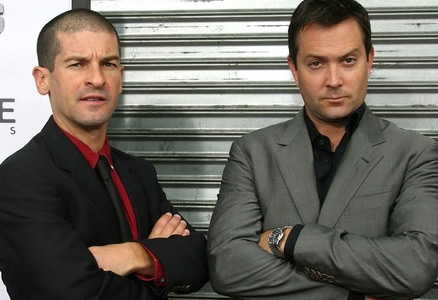
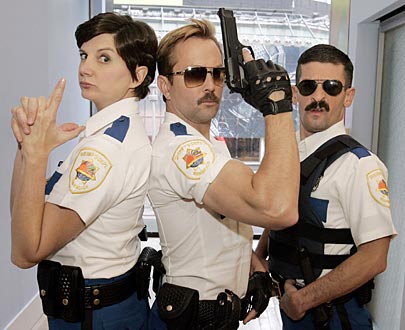
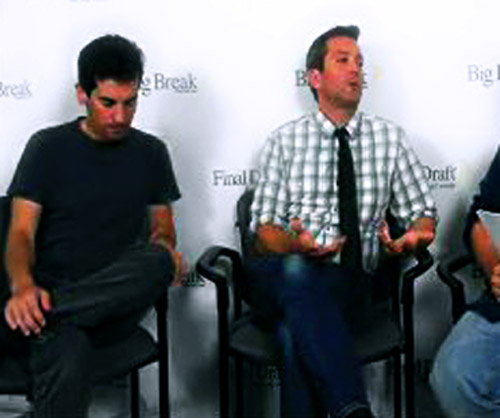
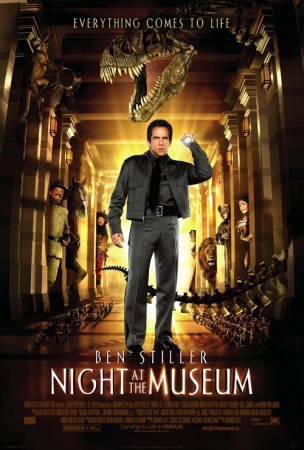

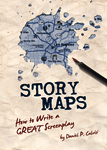
Leave a Reply
Want to join the discussion?Feel free to contribute!